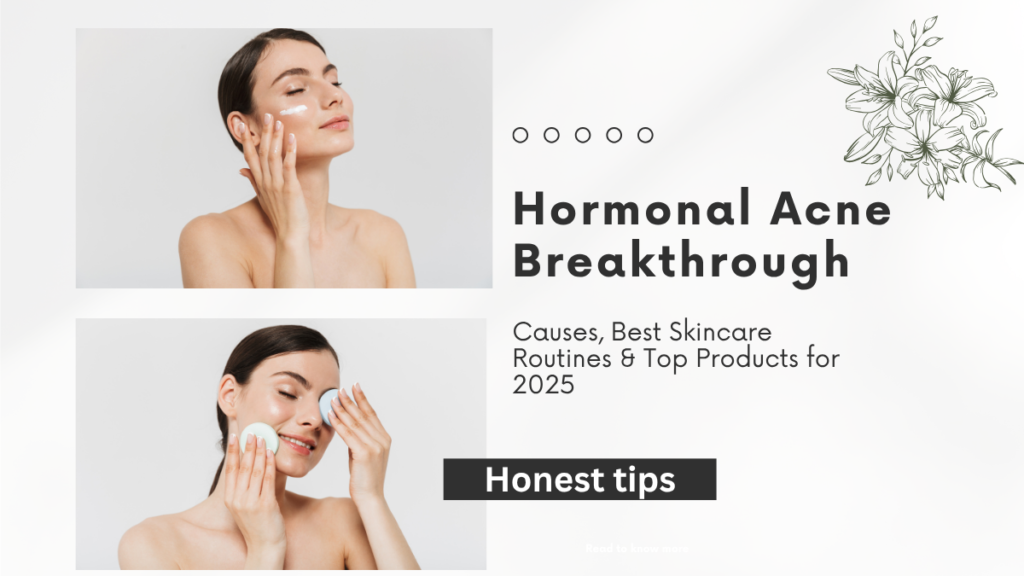Introduction
Hormonal acne isn’t just a teenage problem. For many women aged 25-40, breakouts can appear unexpectedly, often during specific phases of the menstrual cycle, times of stress, or hormonal fluctuations like pregnancy or perimenopause. Unlike occasional blemishes, hormonal acne tends to be deeper, more stubborn, and emotionally frustrating — affecting self-esteem and skin confidence.
If you’ve found yourself battling persistent breakouts around your jawline, chin, or cheeks, you’re not alone. Understanding the root causes and adopting a targeted skincare routine can make a dramatic difference. This guide breaks down what hormonal acne is, why it happens, and the most effective, dermatologist-recommended products and skincare practices to manage it naturally and confidently.
Why This Topic Matters for Modern Women
In today’s fast-paced, stressful, and digitally-driven lifestyle, hormonal acne has become increasingly common among adult women. Balancing career demands, family responsibilities, and self-care often leads to neglected skin health, while hormonal fluctuations tied to menstruation, birth control, and lifestyle habits add to the challenge.
A consistent, well-chosen skincare routine not only treats breakouts but also strengthens your skin barrier, enhances natural radiance, and builds long-term skin resilience. Whether you have occasional flare-ups or ongoing hormonal acne, the right information and products can help you take back control of your complexion.
What Causes Hormonal Acne?
Hormonal acne occurs when fluctuations in hormone levels — especially androgens — trigger excess oil (sebum) production, leading to clogged pores and inflammation. Common causes include:
- Menstrual Cycle Changes: Breakouts often appear 7-10 days before your period.
- Polycystic Ovary Syndrome (PCOS): A hormonal imbalance affecting many women of childbearing age.
- Pregnancy and Postpartum Hormonal Shifts
- Stress: Raises cortisol levels, which can increase oil production.
- Certain Medications: Including some contraceptives or steroid medications.
- Dietary Factors: High-glycemic foods and dairy products may exacerbate breakouts in some individuals.
Essential Skincare Routine for Hormonal Acne
A targeted skincare routine is one of the most effective ways to manage hormonal acne and support clear, balanced skin. Below is an NP-approved, step-by-step morning and evening regimen:
Morning Skincare Routine
- Gentle Cleanser:
Use a sulfate-free, pH-balanced cleanser to remove overnight oil and impurities.
Recommended Product: CeraVe Hydrating Facial Cleanser - Vitamin C Serum:
Brightens skin, reduces inflammation, and protects against environmental stressors.
Recommended Product: La Roche-Posay Pure Vitamin C10 Serum - Oil-Free Moisturizer:
Keeps skin hydrated without clogging pores.
Recommended Product: Neutrogena Hydro Boost Water Gel - Non-Comedogenic Sunscreen:
Essential for preventing pigmentation and skin barrier damage.
Recommended Product: EltaMD UV Clear Broad-Spectrum SPF 46
Evening Skincare Routine
- Double Cleanse:
Use an oil-based cleanser followed by a water-based cleanser to fully remove makeup and sunscreen. - Exfoliating Treatment (2-3x/week):
Chemical exfoliants like BHA (salicylic acid) keep pores clear.
Recommended Product: Paula’s Choice 2% BHA Liquid Exfoliant - Niacinamide Serum:
Reduces redness, balances oil, and strengthens the skin barrier.
Recommended Product: The Ordinary Niacinamide 10% + Zinc 1% - Hydrating Moisturizer:
Restores skin overnight without heaviness.
Lifestyle Tips to Support Clearer Skin
- Prioritize Sleep: Poor sleep can trigger stress hormones and inflammation.
- Adopt a Low-Glycemic Diet: Minimize sugar, processed carbs, and excess dairy.
- Manage Stress: Incorporate breathing exercises, yoga, or walks.
- Keep Your Pillowcase and Phone Clean: Bacteria buildup can aggravate breakouts.
Conclusion
Hormonal acne can be emotionally taxing and physically stubborn, but with the right information and approach, it’s absolutely manageable. A tailored skincare routine, mindful lifestyle habits, and carefully chosen products can help you reclaim clear, healthy skin.
Ready to refresh your skincare lineup? Explore the recommended products above and discover what works for your skin type. Have a favorite hormonal acne product or skincare tip? Share it in the comments — let’s create a space where women support women on their skincare journeys.

